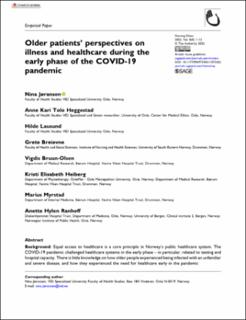| dc.contributor.author | Jøranson, Nina | |
| dc.contributor.author | Heggestad, Anne Kari Tolo | |
| dc.contributor.author | Lausund, Hilde | |
| dc.contributor.author | Breievne, Grete | |
| dc.contributor.author | Bruun-Olsen, Vigdis | |
| dc.contributor.author | Heiberg, Kristi Elisabeth | |
| dc.contributor.author | Myrstad, Marius | |
| dc.contributor.author | Ranhoff, Anette Hylen | |
| dc.date.accessioned | 2022-06-13T11:29:52Z | |
| dc.date.available | 2022-06-13T11:29:52Z | |
| dc.date.created | 2022-04-20T14:12:14Z | |
| dc.date.issued | 2022 | |
| dc.identifier.citation | Jøranson, N., Heggestad, A. K. T., Lausund, H., Breievne, G., Bruun-Olsen, V., Heiberg, K. E., Myrstad, M. & Hylen Ranhoff, A. Older patients’ perspectives on illness and healthcare during the early phase of the COVID-19 pandemic. Nursing Ethics, 0(0), 1-13. | en_US |
| dc.identifier.issn | 0969-7330 | |
| dc.identifier.uri | https://hdl.handle.net/11250/2998510 | |
| dc.description.abstract | Background: Equal access to healthcare is a core principle in Norway’s public healthcare system. The COVID-19 pandemic challenged healthcare systems in the early phase – in particular, related to testing and hospital capacity. There is little knowledge on how older people experienced being infected with an unfamiliar and severe disease, and how they experienced the need for healthcare early in the pandemic.
Aim: To explore the experiences of older people infected by COVID-19 and their need for testing and hospitalisation.
Research design: An explorative and descriptive approach, with qualitative interviews conducted in October 2020.
Participants and research context: Seventeen participants above 60 years of age hospitalised due to COVID-19 during spring 2020 were recruited 6 months after discharge.
Ethical considerations: Ethical approval was granted by the Regional Committee for Medical and Health Research Ethics in South-Eastern Norway (155425).
Findings: The main finding was that the informants experienced vulnerability and arbitrariness. This finding was supported by three sub-themes: experiences with a severe and unfamiliar disease, the strict criteria and the importance of someone advocating needs.
Discussion: Participants described varying access to healthcare. Those who did not meet the national criteria to be tested or hospitalised struggled against the system. Findings reveal arbitrary access to healthcare, in contrast to Norway’s ethical principle of fair and just access to health services. Moreover, to access and receive necessary healthcare, informants were dependent on their next-of-kin’s advocacy.
Conclusion: Even when dealing with an unfamiliar disease, health professionals’ assessments of symptoms must be performed with an ethical obligation to applicate competent appraisal and the exercise of discernment; this is in line with care ethics and ethical standards for nurses. These perspectives are a significant part of caring and the intension of doing good. | en_US |
| dc.language.iso | eng | en_US |
| dc.rights | Navngivelse 4.0 Internasjonal | * |
| dc.rights.uri | http://creativecommons.org/licenses/by/4.0/deed.no | * |
| dc.title | Older patients’ perspectives on illness and healthcare during the early phase of the COVID-19 pandemic | en_US |
| dc.title.alternative | Older patients’ perspectives on illness and healthcare during the early phase of the COVID-19 pandemic | en_US |
| dc.type | Journal article | en_US |
| dc.type | Peer reviewed | en_US |
| dc.description.version | publishedVersion | en_US |
| dc.rights.holder | © The Author(s) 2022. | en_US |
| dc.source.pagenumber | 1-13 | en_US |
| dc.source.volume | 0 | en_US |
| dc.source.journal | Nursing Ethics | en_US |
| dc.source.issue | 0 | en_US |
| dc.identifier.doi | https://doi.org/10.1177%2F09697330211072362 | |
| dc.identifier.cristin | 2017914 | |
| cristin.ispublished | true | |
| cristin.fulltext | original | |
| cristin.qualitycode | 2 | |

